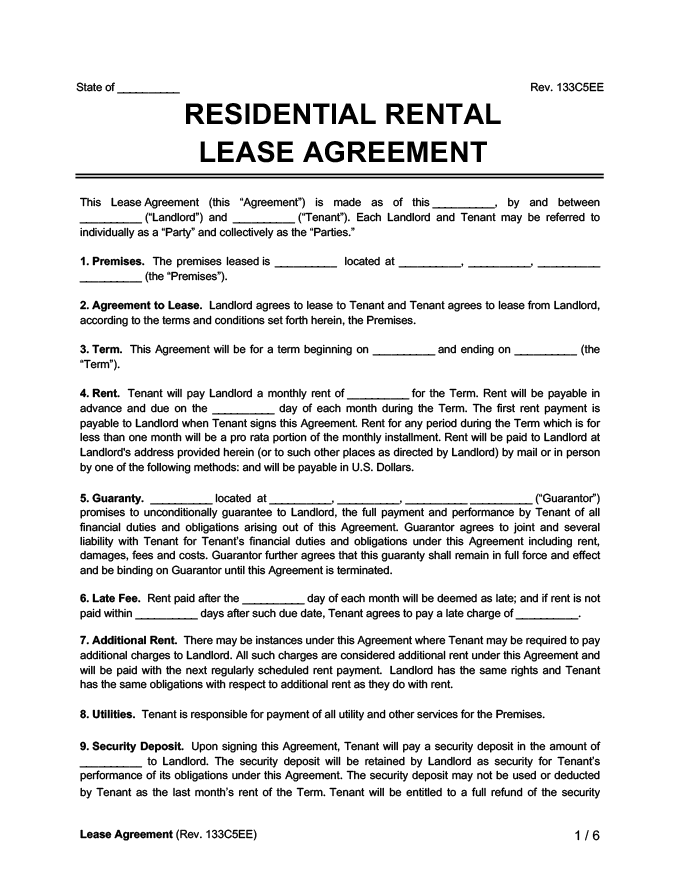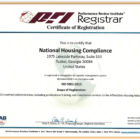Housing Guide: The Basics of Interpreting and Signing a Lease Agreement

If you’ve ever rented an apartment anywhere before, you should be familiar with the lease signing process. If this will be your first time renting somewhere, you will soon learn that the lease is your official contract between you, the renter, and the owner of the place, the landlord or management company. There are many standards that make this type of rental paperwork universally similar for nearly all places rented but there are also many variables. It is therefore, a good idea to know what is expected when signing a lease, what your individual rights are in the process and what factors to look for to ensure that you aren’t getting the raw end of the deal. Below, are the basics and some important details of the lease, explained.
How and When the Lease Is Presented:
A lease is the contract between you and the landowner. Depending on the application process, if any, that you go through in order to be accepted as a potential tenant for the apartment or house, you may or may not have to meet with the landlord more than once. Some management companies require an application, which includes your permission for them to perform a background check on you. Usually there is an application fee, typically about $30. It is almost always non refundable, even if you do not get accepted for the apartment or house. Either way, the official lease document is usually presented to you, after you have casually accepted the landlord’s offer to move you into the residence you have expressed interest in. The document usually consists of several pages, sometimes as many as thirty. The paperwork basically consists of every major and minor matter that should or could ever arise during your tenancy at the new location. It is legally binding, once signed by all parties, for the term specified.
Read The Contract Carefully-EVERYTHING!!!:
The lease contract is more or less a few dozen pages of fine print. In other words, extremely bland and boring. It will not be fun to read. It is kind of like a written equivalent to a graduation ceremony. There is a bunch of material that is generic, only a few sentences specifically for you and about less than two minutes of reading time that is actually interesting and inspiring. But like the graduation ceremony where you have to stay awake and clap for everyone, the entire lease must be read. The catch is, very rarely will a management company or landlord allow you to take the contract home to mull it over. You pretty much have to read it on the spot. So basically, you have to look it over in a timely fashion, unless you want to piss them off. Don’t get me wrong, they probably won’t necessarily rush you. You should just remember that they are often very busy themselves, especially if they own one or more entire apartment buildings, so being conscious of their time is simply considerate. This is why you must be familiar with the lease process before you go into the meeting and prepare yourself for what to expect.
Make Sure That the Lease Covers Major Housing Issues:
It is up to the landlord to ensure that the contract covers everything. Technically, if a situation arose that was not detailed on the lease, it would be up to you and the landowner to come up with an agreement on how to handle the situations. Some landlords are understanding and generous. However, others are out for the next buck and neglectful. Know that anything on the lease is binding for the entire term, and issues that are not, are pretty much open to discretion. While you can always take legal action if a landlord were to impose any rules on you in the middle of the term (unless the lease warns you of such a possibility), it would save yourself the trouble if you simply ensure all bases are covered from the start. It is very important that before you sit down to meet with the landlord to go over the lease you keep in mind (or write down in a list) all of the factors that you can possibly consider and then, if they are not covered in the contract, you must make sure that they are. You have the right to ask the landowner to write an addendum or a list of additional provisions on top of the official, printed lease so that you have it documented and signed.
Speak Up:
Keep in mind that many landlords, especially in larger cities, have area wide standard leases that are prewritten and drawn up by a Rental Housing Association. In the Boston, Massachusetts area and all around New York City, potential tenants are presented with the same exact documents as everyone else in the neighborhood or city, to begin with. Attached behind the standard contract is often additional rules and regulations or amendments to the lease, as designated by the particular landlord in question. Because the leases are standard, some landlords use them so they don’t have to draw up their own. This is good because it covers a lot, but it can also be frustrating because you may find a lot of items on the standard documents do not apply to you at all. It is very common also, for potential tenants to address problems they have with the lease to the landlord, who will respond with a “Don’t worry about that,” or “That doesn’t apply to you”, etc. As a tenant it is your right and duty to make sure that anything that differs from that lease is crossed out, reworded or rewritten completely on another piece of paper if need be, to ensure that it is enforced and legally binding. It’s very easy for people to dismiss these discrepancy because the landlord may seem so nice and friendly and very honest. You figure, well, they said I won’t be held to this, so I suppose I’ll let it go. They hesitate to make the landlord change things because they want to make a good impression. But understand that many authorities in the real estate business are crooked. That is not a generalization, as there are several that are excellent, responsible business conductors but the industry, especially in the Boston area is known for its cutthroat approach to making a profit. So tenants must be extra careful to protect themselves. Landlords are fully aware that they are responsible for making everything on that lease 100% correct and if you come to some agreement that differs, they know they are supposed to not just add it in writing, but they, and you, are supposed to initial any of these changes. If they don’t want to do it, you would be wise to find another landlord.
What to Look For In the Lease:
While most lease contracts follow a standard pattern, and many of them have at least the first half of the document with the exact same verbiage, there are usually many variables that are added. And if they are not added, they should definitely be inquired about and agreed upon. Here is a list of some basic housing issues that need to be covered and understood before putting your signature on any single legally binding document:
Basics: Somewhere, clearly written on the lease must include the specific residence you will be living in, down to the apartment number. It should also include the name of the landlord or Management Company, the names of all tenants signing the lease.
Price: The contract must clearly state how much money will be owed on the apartment or house each month and which day of the month in which it is due. It should also state what you owed and/or have paid toward first month’s rent, last month’s rent, security deposit, and any other additional fees they may have imposed. Also included in this section, the landlord or company must provide you the official address in which to send your rent to. Here it will also let you know if there is any lenience for late payments. In Boston and many other areas, there is a informally known standard that tenants have a leisure time of paying up until the 6th of each month, six days after the most common rental fee due date, the first of the month.
Utilities: Who is responsible for gas, electric, water bills? Very often a few of these utilities, if not all of them are included in your monthly rental fee. This information should not only be included on the lease but they are issues to ask about before even filling out a rental application. You want to know what type of budget you will be looking for in the next year or however long the lease term is. Some places, specifically houses, also use oil to heat the place. You may also have to open a separate account with the oil company. Find out from the landlord during this meeting what companies the building or city area uses for each of these necessities. It would be wise to open an account with each of them in your name, or roommates name immediately, as they sometimes take a little while to be turned on. It would not be fun to try and move into a new place without light or a working toilet. Also, while you are at it, find out about the Cable Company, Phone Company, or Internet service provider in the area or the most preferred, if there are several. Some large buildings even have a deal for their tenants, as an incentive to rent, where they can get package deals on these things for a massive discount.
Occupancy: The contract should clearly state the rules for occupancy of the apartment. It should state if there are any restrictions as far as the number of people allowed to reside in the home. It will discuss the vacancy requirements, which typically claims that the landlord can terminate the lease at will, as long as a thirty days notice is given. It may say something about a penalty if the tenant is the one to give a thirty-day notice early termination. This is the area, too, that might also mention whether or not pets are allowed in the residence. Note that if you are thinking about getting a pet that you feel would not pose any sort of problems or damage to the dwelling, you may try and amend the no pet policy with the landlord ahead of time. Occasionally the company’s state “no pets allowed” to include all pets but really, their main concerns are things like dogs barking or tearing up the place, or shrieking birds. It isn’t uncommon for some building owners to allow cats or rabbits, mice, and other pet rodents but not dogs. So it might be worth a shot as long as you can respect that people usually have very good reasons for making these restrictions and they are usually based on past experiences. The occupancy category should also inform you about subletting rules. Usually the only rules are it is or it simply isn’t allowed. Subletting is when you remain on the lease, but turns your room or entire place over to another person for a period of time while you are away. Find out the rules on subletting and make sure they are clearly stated, even if written in on the lease because even if you have no intention of leaving the dwelling earlier than planned, things come up and you never know when you’ll need that extra option in your housing agreement.
What’s Provided With the Building: Find out if a parking spot designated for you and your household is provided with the lease. Is there a fee for it? If you yourself don’t need the spot, may you rent it out to someone else? Also determine what appliances are in the apartment or house you are renting. Make sure that everything you observed while touring the new place will still be there when you move in. Otherwise, you will need to figure out what you will need to buy yourself and what the landlord will be responsible for. This is an important element of the housing selection process, as occasionally landlords will not provide a refridgerator or laundry with the apartment or house. These extra necessities might be too expensive for you to buy on your own, and may even be the deciding factor that leads you to decline the housing offer. While it seems that they certainly should, management unfortunately is not required to provide you with these amenities.
Repairs and Damages: Finally, make sure that the lease contract outlines the maintenance they will be responsible for. It’s also a good idea to determine how available the maintenance workers are, and how quickly they respond. You want to make sure if you have plumbing back up or something like that the maintenance staff will arrive promptly. There should be the number to call on the lease as well. Additionally, along with the lease you should be given a damage report sheet. You are to take that form upon entering the new residence and you will have probably no more than 30 days to fill it out and give it back to the landlord or management company. The form will have spaces for you to complete regarding the state of the residence. You should be sure to record any obvious damages that were present in the place when you moved in. This ensures that they cannot later place the blame on you for these damages, hold you responsible for paying for them, and possibly withhold some or all of your security deposit.



